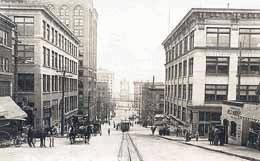In 1908, IWW organizer James H. Walsh, known as the General of the Overalls Brigade, arrives in Spokane and effectively reorganizes the inactive local of the Industrial Workers of the World (IWW, also known as Wobblies). Founded in 1905, the IWW will soon become influential among loggers and migratory agricultural laborers in the Pacific Northwest. It is a democratic union with a mix of radical anti-capitalist politics. Street meetings including speeches and rowdy singing, and direct action (civil disobedience) are key Wobbly organizing strategies.
The Overalls Brigade
James Walsh arrived in Spokane after attending the fourth IWW convention in Chicago. The fourth convention, held in late September 1908, was the first in which the West was well represented (with delegates from Seattle, Portland, Oregon, and Los Angeles). At the convention Walsh represented a loud-singing "hobo" constituency, as the migrant workers of the West were seen, but he along with other Western delegates advocated raising dues, understanding that you could not run a decent organizing campaign without adequate funds.
Walsh arrived in a Spokane thronging with near-destitute migrant laborers who were plagued by exploitive labor agencies. These labor agencies sold jobs, many jobs, to transient or casual workers for "a dollar a job." This job at a lumber camp or construction site, or on a railroad section gang often lasted only a day or two before the laborer was fired and replaced by a new laborer. During one winter, for example, the Somers Lumber Company hired 3,000 men to maintain a crew of 50 men. The labor agencies were the winners, but so were the anti-union employers, since it was impossible for unions to organize workers passing through for a day or two.
From Angry to Organized
Walsh and his fellow organizers began speaking on the street to frustrated and angry workers. One day Walsh intervened and prevented a mob from wrecking one of these employment agencies. The Spokesman-Review of January 18, 1909, reported as follows:
"Hurling rocks and chunks of ice through the windows of the Red Cross Employment Agency, 224 Stevens St., several members of a noisy mob of between 2,000 and 3,000 idle men were about to attempt to wreck the place about 6 o'clock last evening, when James H. Walsh, organizer of the IWW, mounted a chair in the street, stemmed the rising tide of riot and pacified the multitude. In the opinion of the police had it not been for the intervention of Walsh, a riot would surely have followed, as the rabble was worked up to such a pitch that its members would have readily attempted violence. Walsh discouraged violence and summoned all members of the IWW to their hall at the rear of 312 Front Ave. The police dispersed the rest. ... At the hall Walsh warned the crowd against an outbreak. 'There were a lot of hired Pinkertons [a notorious detective agency employed by anti-union firms] in that crowd,' he said. 'All they wanted you fellows to do was to start something and then they would have an excuse for shooting you down or smashing your heads in . ...You can gain nothing by mob rule' "(Thompson and Murfin, 47-48).
Instead Walsh and other organizers urged the men to boycott the agencies and join the IWW.
The revitalized union rented expensive new headquarters, which provided a large library and reading room, office space, and an assembly hall that seated several hundred. The union held inside meetings four nights a week. There were dry economics lectures, rousing speeches, and singing. The union operated a cigar stand and published its own newspaper, the Industrial Worker.
Walsh put a Spokane law firm on a yearly retainer and maintained a voluntary hospital plan for members. By March 1909, Spokane IWW locals could boast 1,200 to 1,500 members in good standing and twice that many on the books.

